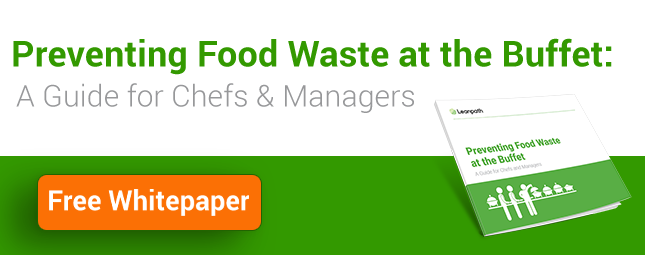11 Ways to Crack the Catering Food Waste Code

We’ve all been to a catered event, whether it was a buffet or a plated meal, a business luncheon or a wedding reception, a breakfast line brimming with scrambled eggs and bacon or a break table piled high with pastries. But I’ll bet you’ve never been to a catered event that ran out of food.
Overproduction is a given for most caterers, because if they run out of food, there’s not a kitchen in the back to prep anything more. This type of food waste is the inconvenient truth of running and organizing a catering event. All the chefs, planners and attendees know it’s happening. Nobody likes it. We all struggle with how to fix the problem. Here are my top tips for preventing catering food waste using proven planning and strategy.
- Make food waste reduction and diversion a part of your planning from the very beginning and communicate your efforts with those planning the event.
- Track and review attendance and consumption data from past events to help determine the type and quantities of food to order.
- Resist the urge to refresh buffets and self service stations too soon. The goal should be to provide just the right amount. If you have a buffet that is full of food at the end of an event - that is not a success, it’s a failure. Check out our free guide to preventing food waste at the buffet.
- Choose in-season foods and menu items that can be procured from local vendors to minimize the carbon footprint. Consider having a menu that consumes fewer resources. Vegetarian selections can be less resource-intensive than proteins and chicken, turkey and pork have lower water and carbon footprints than beef or lamb. This way your waste will at least not impact the environment as hard.
- Apply the same thought process you might take to reduce waste on a salad bar and use it on a hot buffet: shallow containers, smaller serving utensils, diligent refreshing, and pre-portioning of items will help curb waste.
- Add a compost receptacle next to the traditional trash and recycling cans.
- Communicate with your host or attendees about food waste before, during, and after the event. Focus on getting strong numbers of attendees so that the chef knows how many to plan for and can make adjustments.
- Avoid planning buffets if at all possible - plated events have much less waste than buffets. Period. The downside is that labor cost and cleaning expenses are higher for a plated event.
- Provide as many vegetarian options as possible. Meat-eaters can eat vegetarian meals, but vegetarians can’t eat meat. If a meat option runs out, they still have the vegetarian option.
- Have a food salvage/redistribution program in place. Be sure not to uncover/open/serve all food at once, so that if you happen to have overproduced or have excess food and it has been handled correctly, it can be donated.
- Don’t make full portions for everything. If you are preparing a hot luncheon buffet with four possible sides, for example, you can pretty much guarantee that no one will take a full portion of all four choices. You can use creative portioning and really save a lot of waste and money. The same with main courses: the larger variety you offer, the less of each one will be taken. You can optimize the choices by making half portions, so that even if someone wants two different entrees, they will, in effect, only be taking one full portion.
Acknowledging and accepting that there is much work to be done in the catering and event segments to prevent food waste is the first step in solving this puzzle. Track, log, data crunch, and take proactive steps throughout the event planning and preparation. If we can take control of our food waste in our restaurant kitchens, we can take control of our waste for catered events.
Catering events often rely on buffet style service - a huge source of food waste due to overproduction. Elevate your next catering project by reducing food waste with our ultimate guide to preventing food waste at the buffet.

